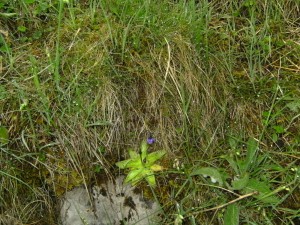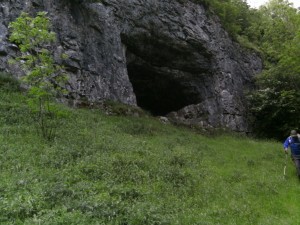Walking and writing
Many years ago, when Nigel Tranter was writing his romanticized novels about the history of Scotland, I met him several times wandering around the East Lothian beaches, notebook in hand, scribbling as he walked. He said he wrote most of his books in that manner. I can’t emulate him. When I go for walks through the spring and summer countryside I find I’ve no option but to see, hear and smell (and in the case of stinging nettles, feel) the world around me. I take photographs, but mostly I allow myself to relax, surrounded by Nature and History, absorbing the world through at least four senses (I draw the line at taste for the most part), and tire myself out in the process. No way could I write drafts of novel while I’m walking. But having walked, I’m more creative at the computer keyboard over the succeeding days – if time allows.
Among my more recent walks was an evening stroll along Deep Dale, a limestone valley about forty minutes’ drive south of my house. The rich limestone flora drew my attention and made me pause as I walked. There were rarities such as limestone fern and white valerian, broad-leafed helleborines, twayblade orchids and milkwort, and – to my surprise – an insectivorous plant, the butterbur, which normally inhabits acidic moorland terrain. It’s a small plant with an insignificant purple flower – the dots on the leaves are the remains of trapped insects:
I walked down the dale as far as Thirst House, a cave in the cliff on the south face of the valley. The etymology of “Thirst” isn’t certain, but it relates to the legend of the Hob who dwells in the cave. A Hob is a creature of the faery realm, akin to the Scottish brownie and the German kobold, which is part nature spirit and part household spirit. Hobs will do household chores or even farm work for you if you treat them properly, i.e. don’t look at them and leave them food and drink to reward their labours (in most cases, a bowl of porridge and a cup of ale are acceptable). ‘Thirst’ might be an abbreviation for ‘Hob o’ th’ hurst’, where ‘hurst’ is a Northern Old English name for a wood, or it might derive from the Anglian ‘Thyrst’, meaning a giant. Hobs were often small enough to slip through keyholes but they could also become giants. The were – are? – size-shifters rather than shape-shifters.
That was Wednesday evening last week. Thursday was a very busy day (creative writing group in the morning, lunch with some of the gang, shopping to buy and take home, playwriting class in New Mills at 5 p.m., Creative Focus Group meeting in Glossop at 7.30), but on Friday and Saturday I set to work with a will on a difficult piece of my novel and wrote about 3000 words. Perhaps the Hob in Thirst House inspired me, because I approached his home with proper respect and left a gift of flowers, freshly-picked bloody cranesbills from below the cave mouth.
I hope he’ll be with me on Tuesday evening, when Margaret and Pam and I are doing our first three-way Meet The Authors session. We hope to sell a few of our books (and perhaps one or two of my CDs). I shall report the outcome, and other activities – not least the Glossop Music Festival, scheduled for next Friday and Saturday – when I post my next blog.


Leave a Comment
Logged in as - Log out